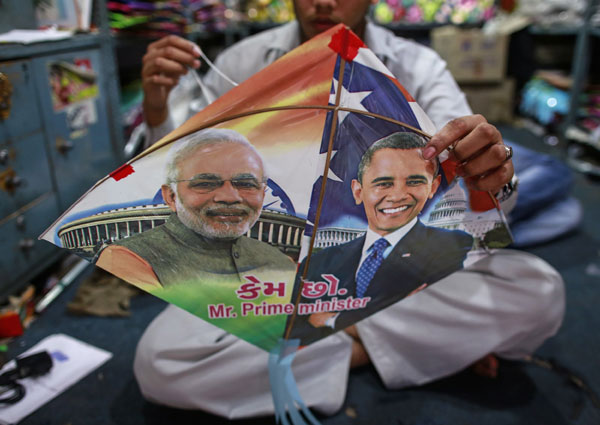What Obama's India visit means to China
Updated: 2015-01-26 07:44
By Swaran Singh(China Daily)
|
||||||||
 |
|
An employee ties threads on a kite, with portraits of Indian Prime Minister Narendra Modi (L) and US President Barack Obama, ahead of Obama's visit, in Mumbai January 23, 2015. |
India may be pushed back against China once again. This, in essence, is the line many media commentaries have been taking. It is this backdrop that makes US President Barack Obama's visit as the chief guest at India's Republic Day parade on Jan 26 interesting. His visit follows that of Japanese Prime Minister Shinzo Abe, who visited India last year in same capacity and whose second visit is expected in the near future.
Indian Prime Minister Narendra Modi's hyperactive foreign policy has triggered speculation of all kinds. Modi has been warming up to his decades-long detractor, the United States - reflected in the back-to-back visits of American secretaries of commerce, defense and state and more than a dozen other senior officials, making India the largest buyer of American weapons and the US the largest trading partner of India. US allies have taken this as a signal to indulge India's new leadership.
Or, are the US allies leading India up the garden path in New Delhi. The fact that Japan and India both have territorial disputes with China is often seen as the reason for the bonhomie between the second- and third-largest economies in Asia. Indeed, Japan was the only developed country not to shun Modi when he, as chief minister of the province of Gujarat, was accused of violating human rights.
India today seems friendly with all major powers, raising questions on how it will balance its engagements with the US and its allies on one hand and China and Russia on the other. Just three years ago, China was India's largest trading partner, and Russia was seen as the largest supplier of its defense technologies.
Even today China remains an important trading partner; in fact, it recently promised to invest $20 billion to revive India's manufacturing sector, especially the power generation sector. This, seen against the backdrop of the hyperactive bonhomie among emerging economies, such as the member states of BRICS (Brazil, Russia, India, China and South Africa), BASIC (Brazil, South Africa, India and China) and RIC (Russia, India and China), has been worrying Western powers facing economic slowdown since 2007.
- Global health entering new era: WHO chief
- Brazil's planning minister steps aside after recordings revelation
- Vietnam, US adopt joint statement on advancing comprehensive partnership
- European border closures 'inhumane': UN refugee agency
- Japan's foreign minister calls A-bombings extremely regrettable
- Fukushima impact unprecedented for oceans: US expert

 Stars of Lijiang River: Elderly brothers with white beards
Stars of Lijiang River: Elderly brothers with white beards
 Wealthy Chinese children paying money to learn British manners
Wealthy Chinese children paying money to learn British manners
 Military-style wedding: Fighter jets, grooms in dashing uniforms
Military-style wedding: Fighter jets, grooms in dashing uniforms
 Striking photos around the world: May 16 - May 22
Striking photos around the world: May 16 - May 22
 Robots help elderly in nursing home in east China
Robots help elderly in nursing home in east China
 Hanging in the air: Chongqing holds rescue drill
Hanging in the air: Chongqing holds rescue drill
 2.1-ton tofu finishes in two hours in central China
2.1-ton tofu finishes in two hours in central China
 Six things you may not know about Grain Buds
Six things you may not know about Grain Buds
Most Viewed
Editor's Picks

|

|

|

|

|

|
Today's Top News
Liang avoids jail in shooting death
China's finance minister addresses ratings downgrade
Duke alumni visit Chinese Embassy
Marriott unlikely to top Anbang offer for Starwood: Observers
Chinese biopharma debuts on Nasdaq
What ends Jeb Bush's White House hopes
Investigation for Nicolas's campaign
Will US-ASEAN meeting be good for region?
US Weekly

|

|









